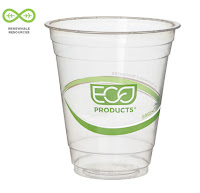Good question! When organizing events, we were faced with the issue of what kind of cups to use a couple of years ago and
decided to go with compostable cups because production/ingredients are
better and we had access to a composting facility. If you don't have access to a facility, the cups
will end up in the landfill as any other trash.
Reusable cups will always be the best option.
For disposable, there are a few greener options to consider. Let me list some of the pros/cons of these options to help you make a decision:
For disposable, there are a few greener options to consider. Let me list some of the pros/cons of these options to help you make a decision:
Pros: Low cost; can be recycled through Terracycle; light; no leaks; people are used to them; easy to
find/buy
find/buy
Cons: Support single-use plastic industry; contribute to the fossil fuel industry; manufacturing not a clean process;
users exposed to plastic chemical; break down into small plastic pieces if not properly disposed
2. Compostable
Pros: Made
from compostable ingredients (sugarcane bagasse; corn starch etc);
support green industry; degrade faster and naturally (in industrial
composting environment) Cons: More expensive than regular plastic; a bit of research involved in picking the best option/vendor; without an industrial composting facility, they will have to go to the landfill; break down into small plastic pieces if not properly disposed
- bio-based plastic is still plastic (bio-based plastic made from renewable raw materials such as corn-based resin): https://www.
nationalgeographic.com/ environment/2018/11/are- bioplastics-made-from-plants- better-for-environment-ocean- plastic/ - “If PLA [bioplastic] does leak out, it also will not biodegrade in the ocean,” says Jambeck. “It's really not any different from those industrial polymers. It can be composted in an industrial facility, but if the town doesn't have one, then it's not any different.”
Pros: Normally cheaper than compostable option;
support recycling industry; are made from up to 30%
recycled plastic
recycled plastic
Cons: Also supports single-use plastic industry; contributes to the fossil fuel industry; manufacturing not a clean process;
users exposed to plastic chemical; go to the landfill; break down into small plastic pieces if not properly dispose
4. Paper (from responsible sources/renewable material)
Cons: More expensive than regular plastic cups; go to the landfill;
production
is resource-use intensive; might leak; use plastic coat
- the meaning of responsible source: https://www.treehugger.com/
corporate-responsibility/look- label-sfi-logo-sign- sustainable-forestry.html
- paper cups not recyclable in Brevard: https://www.choice.com.au/
food-and-drink/drinks/tea-and- coffee/articles/are-takeaway- coffee-cups-recyclable
In sum: if it is disposable, it's not eco-friendly - it will become waste a few minutes after being used.
But if you are really going for disposable, your pick will most probably depend on your budget and who you want to support. As you can see from the list above, most of the disposable cups will end up going to the landfill...
But if you are really going for disposable, your pick will most probably depend on your budget and who you want to support. As you can see from the list above, most of the disposable cups will end up going to the landfill...




